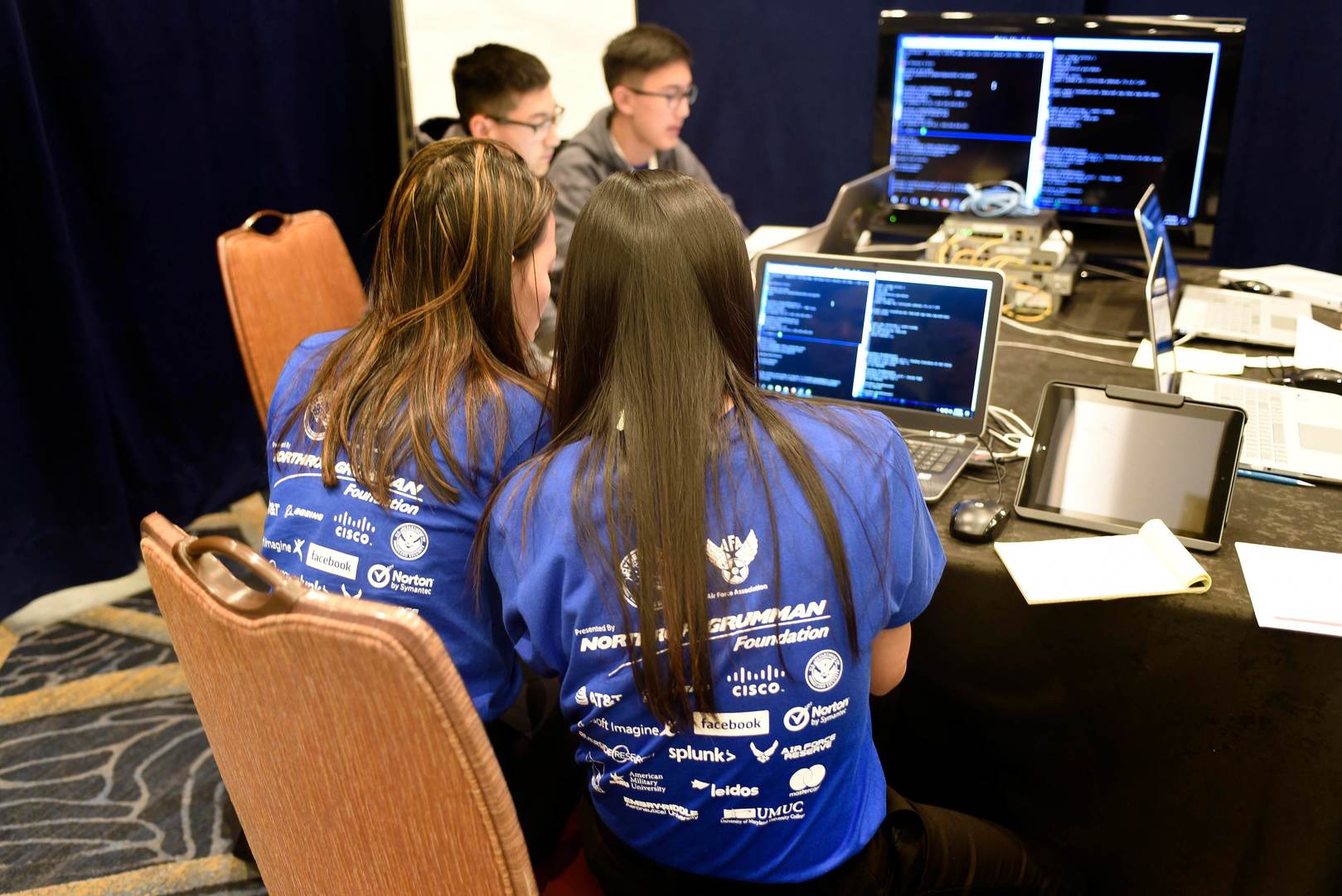Cybersecurity is a booming field of computer science and the need for cybersecurity professionals is becoming acute. You may be surprised to learn that there are a number of competitions, workshops, and classes that introduce teens to this field and build their skills, preparing them for college studies and future careers.
What does the work entail? It has two major components: protecting systems and data from hackers proactively, and ensuring the security of information routinely. Even to a 21st-century digital native, this may not sound too appealing or seem dauntingly technical and inaccessible. Yet, as this excellent graphic about cybersecurity jobs by the SANS Institute explains, there are various positions within cybersecurity, offering a fit for many different working styles, personality types, and interests.
And in addition to being an excellent career choice, learning cybersecurity is fun! For teens that love puzzles and logic problems, exploring cybersecurity could be a great introduction to computer science, potentially leading to a rewarding profession with many different work settings and career paths to choose from.

School-Year Programs
How can teens be introduced to cybersecurity early enough to decide whether it’s a subject they want to study in college and a career they want to pursue?
Today’s article will highlight some different ways for students to learn about cybersecurity during the school year. This is a chance for students to explore this exciting area of computer science before heading to college; it’s also an engaging and intellectually challenging way to test their skills and compete against other students and teams.
In particular, the article features three cybersecurity competitions, including CyberPatriot, the nation’s largest youth cyber defense competition, as well as cybersecurity workshops and classes. You can find even more K12 programs and competitions in an extensive list curated by the federal government’s National Institute of Standards and Technology.
Competitions
CyberPatriot’s National Youth Cyber Defense Competition
CyberPatriot is an initiative by the Air & Space Forces Association (AFA), which runs programs for elementary, middle school, and high school students. Its keystone program, the National Youth Cyber DefenseCompetition, is designed for middle and high school students with any level of cybersecurity knowledge, including beginners.
This after-school activity is offered through schools or other organizations (e.g., scouting units, 4-H clubs, Boys and Girls Clubs, STEM programs, etc.). Small teams of students work with an adult coach, technical mentor(s), and adult team assistant(s) to learn skills and practice solving cybersecurity problems embedded in the AFA’s virtual operating systems.
The online competitions challenge teams to find and fix cybersecurity vulnerabilities in virtual operating systems. There are several online rounds of competition starting in November, culminating in an in-person National Finals Competition in the spring. Team registration runs from April through early October. Visit uscyberpatriot.org for details and registration. You can also learn more about the program in my in-depth article about CyberPatriot.
“Some students join CyberPatriot because they already know they want to pursue education or a career in cybersecurity, but others join because they are interested to learn more. It’s amazing to see the shift in these students from the start of the competition to the end — they come in unsure of their abilities and leave with strong confidence in what they’ve learned and what they are able to achieve. They find a new passion for something they maybe never would have considered had it not been for the program.” —Rebecca Dalton, Director of Program Engagement, CyberPatriot
CyberStart America
CyberStart America’s mission is “to build a US national pipeline for talented students to enter the cybersecurity workforce.” It gives free access to an immersive online learning platform that challenges high school students to solve the kinds of problems and puzzles that typically confront computer science or cybersecurity professionals. Students learn skills like password cracking, forensics, coding in Python, and code breaking, all by solving fun, real-world cyber challenges. Experience or previous technical coursework is not necessary; users learn everything they need to know within each game, often from videos embedded within the game.
High-scoring players are invited to apply for awards through the National Cyber Scholarship Foundation program, where they can earn life-changing recognition and college scholarship opportunities. Students can participate in CyberStart America between October and March (registration opens on October 16, 2023). Learn more about CyberStart America and the scholarship competition and register to participate at cyberstartamerica.org.
“CyberStart REALLY made a big impact on my daughter! The first year, she had zero experience in computer coding or cybersecurity. After participating, she decided to take AP Computer Science A and now she won a summer internship at the NJ Cyber Security Office!”—Parent of CyberStart student
CYBER.ORG
CYBER.ORG is a platform for teachers dedicated to K-12 cyber education. In addition to free cyber lessons, courses, and workshops for teachers, it sponsors the National Cyber Cup, a free, Jeopardy-style, capture-the-flag type competition for 4th-12th-grade students focusing on cybersecurity themes and challenges.
Classes and Workshops
Increasingly, I see organizations offering introductory cybersecurity classes and workshops for students. Many are live, instructor-led online classes, so students can participate from home. The shortlist below is just a start—check with your local tech education organizations to find out if they’re providing any classes on the topic.
- TechGirlz is a volunteer-driven non-profit program helping middle school girls explore the possibilities in technology. They provide free, hands-on, project-based workshops and camps for girls in grades 5-8, virtually or in person. They offer a variety of cybersecurity workshops teaching different aspects of cybersecurity, from basics to encryption and the Internet of Things. View and register for upcoming workshops.
- iD Tech has an extensive catalog of online tech courses, including coding, game development, and robotics, and offers 1-on-1 online teaching on a variety of topics, including cybersecurity. The cybersecurity curriculum includes encrypting and decrypting messages using Python, learning various encryption methods, and developing security and analytical skills.
- Juni offers online coding, science, communication, math, and investing and entrepreneurship classes. In the 1-on-1 Intro to Hacking and Cybersecurity course, Juni instructors teach students how hacking and cybersecurity work and how to prevent common security threats, using Python.
- codeConnects provides personalized online instruction to students grade 3-12 in cutting-edge tech fields, including artificial intelligence, cybersecurity, and mobile apps. In the cybersecurity course, students learn how to write programming to help secure their networks and prevent hackers and attacks. Students are introduced to Linux and bash scripting, forensics, web security, and cryptography.
Other Ways to Explore Cybersecurity
Summer can be a great time to explore cybersecurity and get the chance to explore the field and learn foundational principles and skills before entering college. Read more about Cybersecurity Summer Camps for Teens.
Some universities and colleges offer pre-college cybersecurity summer programs. For example, NYU and the University of Maryland offer programs. University-based programs have the added benefit of giving your teen the experience of being on a college campus and talking with college students, helping to prepare them for their college search process.
The best way to learn about these programs is to contact your local university’s computer science department and inquire about their cybersecurity offerings for high school students. This is also a good opportunity to ask about their curriculum, type of degrees offered, professors, and their success at career placement. Not only will you learn about their program, but your inquiry will also demonstrate your interest and curiosity about the university and what they have to offer.
Final Thoughts
Cybersecurity may sound like a highly technical field that requires years of college-level coursework and development of deep skills and experience (and for some cybersecurity careers, this is the case). Yet there are many ways for teens to get involved, learn about the many facets of the field, and get some hands-on training that is both fun and challenging. For a teen interested in tech, a cybersecurity after-school or summer program may help to introduce potential academic and career paths they hadn’t considered, and give them new skills that are transferable to other tech domains even if they don’t choose cybersecurity as a direction.
Many national agencies like the Air Force, National Science Foundation, and National Security Agency are keen to interest students in this field and offer support to schools and other organizations that want to run programs in cybersecurity. Check with your school to see if it offers any programs or competitions, and if not—consider taking advantage of those resources and starting your own!
Image Credit: CyberPatriot
Editor’s Note: Originally published October 2020.







